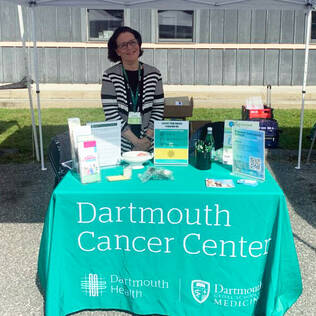We are dedicated to engaging community members and organizations in our research. As a National Cancer Institute-Designated Comprehensive Cancer Center, we focus on:
- Incorporating community input into our research priorities
- Planning and partnering with our community when conducting research in our catchment area
Because of this, our research reflects the voices of patients, community members, community organizations, and care partners. Studies show many benefits to researchers from using community-engaged research methods, including:
- Increased knowledge of the community's needs
- Increased likelihood of community participation in research studies
- Improved dissemination of evidence and translation to policy and practice1, 2, 3
To learn more, please refer to the sections on this page below:
Dartmouth Cancer Center services and resources
Our team is here to help researchers interested in starting or expanding their community-engaged research plans. We support you in seeking to engage community members and community organizations in cancer-related research.
While our most common services and resources are described below, we strive to meet the diverse needs of our research community. We are happy to discuss additional ways to provide community-engaged research support.
As a first step, we encourage you to schedule a consultation with our team to discuss your research and community engagement goals. To schedule a consultation, please email DCC.Community.Outreach@dartmouth.edu.
If you're ready to request specific services and resources from our team, please complete our Request for Support from Community Outreach and Engagement form.
Community Advisory Board support
We can support you if you want to start or maintain a community advisory board for your study or research program. We can guide you with existing staff capacity to convene your advisory board, or we can provide:
- Hands-on support with functions such as recruitment of board members
- Design of meeting agendas
- Facilitation of meetings
- Administration of compensation for board members
Community Engagement Studios
Community Engagement Studios are one-time meetings in which researchers share information about a research study they are planning, and members of the study population give feedback on ways to improve the study.
For example, if you're planning a clinical trial to treat breast cancer, you may meet with 8-10 breast cancer survivors in a Studio to get feedback on how to:
- Improve the study flow for patients
- Review patient-facing materials
- Get input on study recruitment plans
We work with you to plan and facilitate Studios, which generally take place on Zoom from 5:30 to 7:30 pm on a weekday evening. However, you should try to meet the scheduling needs of the population participating in the Studio. If you're considering a Studio, please complete our request form at least 10 weeks before you would like the Studio to take place.
Community research ambassador partnerships
Our Community Research Ambassadors Together Ending Cancer (CREATE) program allows researchers to engage with cancer survivors and care partners ('Community Research Ambassadors') who have lived experience with the cancer being studied.
Through CREATE, our team matches you with Community Research Ambassadors to partner longitudinally. Though every partnership looks different, Community Research Ambassadors often:
- Participate in meetings with your research team
- Guide study methods, recruitment plans, and outcomes being evaluated
- Review consent forms and other public- and patient-facing study materials
- Support dissemination efforts
Connections to community organizations
We can facilitate connections between you and community-based organizations to support collaborative research and projects. We have many existing partnerships throughout our catchment area and are continuously expanding our network of partners.
Dissemination support
In addition to disseminating research findings and evidence through traditional academic publications and conferences, it is also important that we disseminate information to our broader community and those most impacted by our research.
Doing so can instill hope in cancer survivors, care partners, and other cancer community members that progress is being made. We can help researchers engage with community members to:
- Design a dissemination plan
- Create messaging and materials that are understandable and engaging to public audiences
Additional resources
Additional resources to support community-engaged research are available throughout Dartmouth and Dartmouth Health, including:
- Dartmouth Center for Implementation Science
- Dartmouth Center for Social Impact
- Dartmouth Geisel School of Medicine Community Service Learning Program
- Dartmouth Health Center for Advancing Rural Health Equity
- Dartmouth SYNERGY Clinical and Translational Science Institute
Citations
- Holzer, J. K., Ellis, L., & Merritt, M. W. (2014). Why we need community engagement in medical research. Journal of Investigative Medicine, 62(6), 851-855.
- Luger, T. M., Hamilton, A. B., & True, G. (2020). Measuring community‐engaged research contexts, processes, and outcomes: a mapping review. The Milbank Quarterly, 98(2), 493-553.
- Skinner, J. S., Williams, N. A., Richmond, A., Brown, J., Strelnick, A. H., Calhoun, K., ... & Wilkins, C. H. (2018). Community experiences and perceptions of clinical and translational research and researchers. Progress in community health partnerships: research, education, and action, 12(3), 263.
